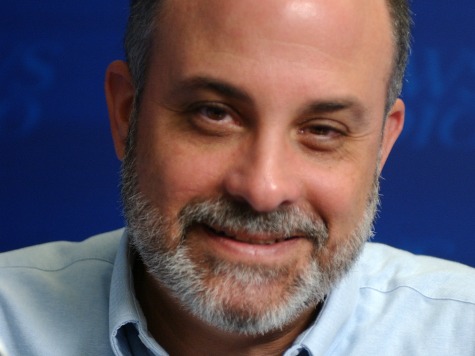
During his October 3rd radio broadcast, conservative host and author Mark Levin warned his listeners that President Obama is moving beyond the current partial government shutdown and on to the debt ceiling. As he campaigns against Republicans, Obama is creating fear among those on government support programs and even in the financial markets, that Tea Party “extremists” will allow the government to “default,” paving the way for low-information Americans to support him as he bypasses Congress and unilaterally takes control of the country’s economy:
Default, default, default…why is he saying that? Just to scare people? Well, that’s part of it, obviously. But, it’s more than that, ladies and gentlemen. Barack Obama is plotting, that if he can’t get what he wants out of the House Republicans, that if he can’t get his Plan A, and get Boehner and the Republicans to buckle – not just on the Continuing Resolution – but on the debt ceiling, then he’s got his Plan B.
His Plan B is the most egregious attack on our Constitution by a President, not just in modern history, but in all our history, if, in fact, he unleashes it…
Levin said that, urged on by Democrats like Nancy Pelosi and Bill Clinton, Obama is primed to bypass Congress, “to raise the debt ceiling unilaterally as President of the United States, using the 14th Amendment as a fig leaf, to seize from Congress the power of the purse.”
Observing that Obama is already calling for liberal ideologues and academics to provide cover for his plan, Levin noted a recent New York Times op-ed by Henry J. Aaron, a senior fellow at the Brookings Institution, who point-blank recommends that Obama should “ignore the debt ceiling,” since doing so is the “least bad” law for him to break.
Under the dubious premise that the United States will default on its debts, and thereby incur a “full-blown constitutional crisis,” should the debt ceiling not be raised, Aaron writes that he agrees with Columbia Law professors Neil H. Buchanan and Michael C. Dorf who argued that Obama’s disregard of the debt ceiling would be less incriminating than placing the nation in “default.” Aaron primes the courts as well for the ultimate plan:
In this case, the consequences are so overwhelmingly on one side that they cannot be ignored by the president and should not be ignored by the courts. If the debt ceiling is not increased, the president should disregard it, and honor spending and tax legislation.
A decision to cut spending enough to avoid borrowing would instantaneously slash outlays by approximately $600 billion a year. Cutting payments to veterans, Social Security benefits and interest on the national debt by half would just about do the job. But such cuts would not only illegally betray promises to veterans, the elderly and disabled and bondholders; they would destroy the credit standing of the United States and boost borrowing costs on the nation’s $12 trillion publicly held debt.
As Romina Boccia at the Heritage Foundation wrote recently, however, refusing an immediate hike in the debt limit does not automatically translate into the “crisis” that Obama and his supporters would like Americans to embrace:
If Congress does not raise the debt limit by mid-October, the Treasury would not necessarily default on debt obligations. Even while cash-strapped, the Treasury can reasonably be expected to prioritize principal and interest payments on the national debt, protecting the full faith and credit of the United States above all other spending. It is almost impossible to conceive that the Treasury and the President would choose to default on debt obligations because doing so would have damaging economic consequences.
Cuts in discretionary spending and reform of entitlement programs – beginning with the repeal of ObamaCare, yet a new entitlement – are the ways Congress can place the nation’s budget on a path to balance, says Boccia.
Aaron, however, using a frame of reference that asserts the U.S. is currently in an “economic recovery,” writes that spending cuts cannot be made because it is simply too difficult to decide which programs or education grants to limit.
“No matter how the cuts might be distributed, they would, if sustained for more than a very brief period, kill the economic recovery and cause unemployment to return quickly to double digits,” he writes.
In the end, Levin asserts, Obama is already campaigning and priming the country for his coup of the Constitution, the ultimate “fundamental transformation” of the nation as he has promised:
So, it is he who is prepared to extort and blackmail in ways that most of you, and most of my colleagues in this business can’t even imagine, or don’t even understand. And, if the President of the United States unilaterally lifts the debt ceiling, you can kiss the core functions of Congress goodbye, you can kiss this Republic goodbye, once and for all. And, then, I think, the focus can be on the Liberty Amendments.

COMMENTS
Please let us know if you're having issues with commenting.